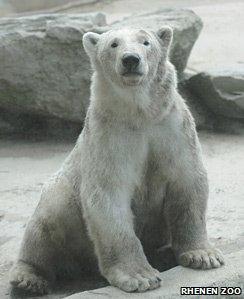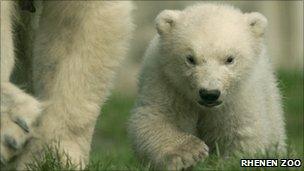New polar bear in Highland Wildlife Park breeding plan
- Published

Walker is being moved from a zoo in Holland to the Highland Wildlife Park
A young male polar bear being brought to Scotland will be part of a park's future plans to breed the animals.
Walker is due to arrive at the Highland Wildlife Park at Kincraig from Rhenen Zoo on Friday.
The site in the Cairngorms National Park is already home to Mercedes, a female too old to be included in the proposals to raise cubs.
Animal protection charity OneKind said any polar bear captive breeding programmes were "inherently flawed".
Two-year-old Walker will not reach sexual maturity for another three years.
The park is run by the Royal Zoological Society of Scotland, which also owns Edinburgh Zoo.
Mercedes is the only polar bear in the UK.
An extension has been added to her enclosure so the two animals can be managed separately before later getting access to the same area.
Walker will eventually be moved to a new enclosure.
The Highland Wildlife Park was approached by the European Endangered Species Programme co-ordinator for polar bears and Rhenen Zoo about taking on Walker.
His mother Huggies is expecting another litter and the young male needed a new home.
'Excellent memory'
Douglas Richardson, collection manager at the park, said Walker should see Mercedes as a "mother figure".
He said: "The bears will be gradually introduced to each other with a view to them living together with both having permanent access to the whole facility.
"Although polar bears are generally solitary animals that are happy being alone, they have an excellent memory.

Walker as a cub at Rhenen Zoo in Holland
"Mercedes has been with other bears before so we are expecting the introduction to go fairly smoothly."
Mr Richardson added: "Walker will not reach sexual maturity for at least another three years so should present no threat to Mercedes - being a teenager he does have a cheeky side, but we expect him to see Mercedes as a mother figure having been recently separated from his own mother."
Ross Minett, campaigns director at OneKind, said polar bears have complex behavioural needs that cannot be met in captivity.
He said: "It is impossible to re-create the natural conditions these animals would experience in the wild, therefore polar bears are one of the most inappropriate animals to keep in captivity.
"Any captive breeding programme is inherently flawed as any bears born are likely to be incapable of surviving in the wild, and therefore condemned to remain in captivity for the rest of their lives.
"True conservation is about protecting these wonderful animals in the wild in their natural habitat."
The Army
Last year, the Born Free Foundation welcomed Mercedes' move to a larger enclosure but said breeding the species in captivity affected the bears' natural behaviour.
Mercedes was rescued from her native Canada and brought to Scotland in 1984, after she was scheduled to be shot because she was roaming into a nearby town in search of food.
She was relocated from where she was kept at Edinburgh Zoo to the park in October last year.
Her new enclosure extends over four acres of land regarded as more typical of the natural habitat of polar bears.
A public appeal helped to raise £75,000 needed to fund her transfer and the Army assisted in building the bear's home and a nearby visitors' car park.